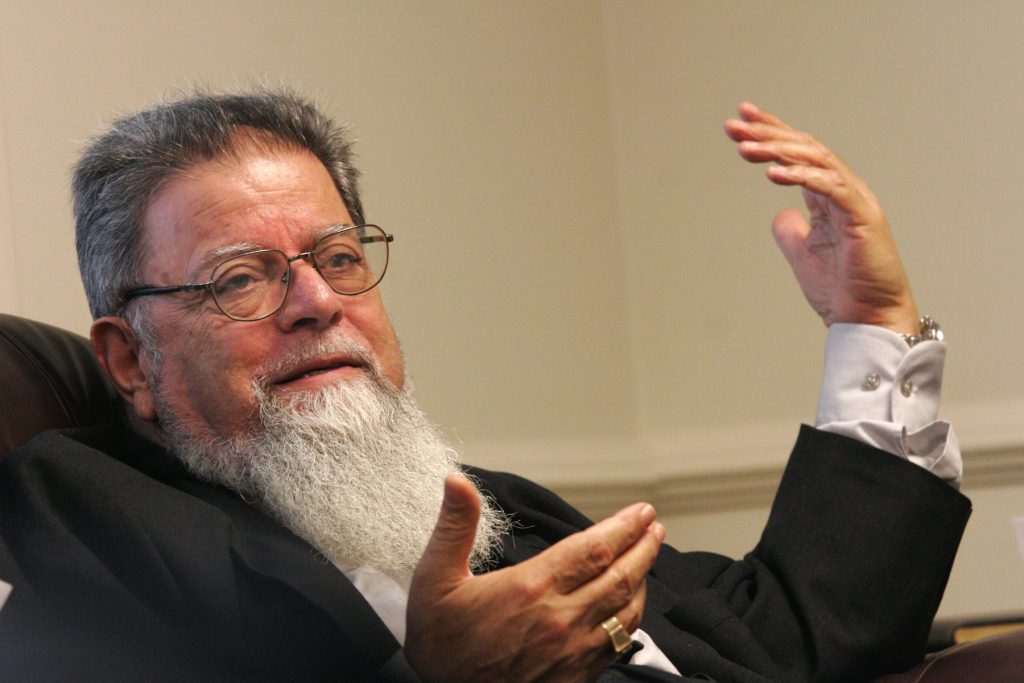
Throughout Lent, we’re exploring the parables of Jesus – the two dozen or so stories that were his chief means of describing the reality of God’s rule on earth.
Father Elias Chacour describes himself as a “Palestinian-Arab-Christian-Israeli.”
At one time or another, as bishop of the Greek Catholic Church in northern Israel, he has needed to call on each of those identities to help facilitate forgiveness and reconciliation among neighbors.
Having explored the themes of grace and forgiveness in Jesus’ Parable of the Unmerciful Servant the past two days, it’s worth pondering a memorable story from his experience as a pastor.
Some of Chacour’s greatest personal struggles have been associated with trying to bring peace to a tiny congregation in the village of Ibillin, not far from the Sea of Galilee. In 1973, he was assigned to shepherd this tiny flock “for just a month,” to see how things might go.
What Chacour discovered was a church torn apart by bitterness, anger, and unforgiveness. The parishioners quite simply hated each other. The first church member that Chacour met when he came into town screamed at him, “Get out! We don’t want you here!”
The trial-and-error 30 days became a second month, and then another. But Chacour felt incapable of penetrating the darkness of this angry little flock.
He was especially grieved on the night he was called to the home of Abu Mouhib, a church member who happened to be a policeman. Mouhib’s mother was dying. As she breathed her last breath, Chacour gently suggested that Mouhib ought to summon his three brothers, who also lived in the village, so they could pay final respects to their mother. “No!” he shouted. “My brothers do not set foot in my house. If they dare to come here you will have five funerals on your hands, because we will kill each other.”
Attendance at services was usually poor, except for the weeks associated with Christmas and Easter. On Palm Sunday, after 18 grueling months as pastor in Ibillin, Chacour felt completely defeated.
The benches were full because it was a special Sunday. But, as Chacour puts it in his book Blood Brothers, “Looks of open hostility greeted me… I was amazed to see Abu Mouhib, the policeman, perched in the very front row with his wife and children. In each of the other three quadrants of the church, as distant from one another as possible, were his three brothers… I rose and began the first hymn, certain that no one [outside] would be attracted by our pathetically dismal singing… What followed was undoubtedly the stiffest service, the most unimpassioned sermon of my life. The congregation endured me indifferently… But then, they did not suspect what was coming.”
After the benediction, Chacour closed the double doors at the back of the church. He reached into his pocket and pulled out a thick chain, laced it through the door handles, and secured it with a padlock. Then he walked to the front of the sanctuary and said, “Sitting in this building does not make you a Christian. You are a people divided. You argue and hate each other – gossip and spread malicious lies. What do the Muslims and the unbelievers think when they see you? … If you can’t love your brother that you see, how can you say you love God who is invisible?”
The shock in the sanctuary quickly turned to anger. But Chacour kept speaking, explaining that he had tried to unite them and failed. He said, “But there is someone else who can bring you together in true unity. His name is Jesus Christ. He is the one who gives you power to forgive. So now I will be quiet and allow him to give you that power. If you will not forgive, we will stay locked in here. You can kill each other and I’ll provide your funerals gratis.
“Silence hung. Tight-lipped, fists clenched, everyone glared at me as if carved from stone. I waited. With agonizing slowness, the minutes passed. Three minutes…five…ten…”
Just as Chacour began to despair that he had undone all his months of hard work with a single, outrageous act, he noticed movement. Someone stood up.
“Abu Mouhib rose and faced the congregation, his head bowed, remorse shining in his eyes… ‘I’m sorry,’ he faltered. ‘I am the worst of all. I’ve hated my own brothers. Hated them so much I wanted to kill them. More than any of you I need forgiveness.’” Turning to Chacour he said, “Can you forgive me, too, Father?”
Chacour embraced him. In an instant his three brothers had rushed to his side. “They held each other in a long embrace, each one asking forgiveness of the others… The church was a chaos of embracing and repentance. Cousins who had not spoken to each other in years, wept together openly.”
That morning they decided to celebrate Easter one week early. They sang and wept for another hour, then poured out into the streets of Ibillin. Abu Mouhib’s small step was the beginning of the transformation of that village – the village where Elias Chacour ultimately lived and served for another four decades.
Don’t wait for someone to put a padlock on your door to force you to take action.
If you’ve been struggling with an unseen padlock on your heart, God can give you the grace to cast it aside.
It can happen today.
